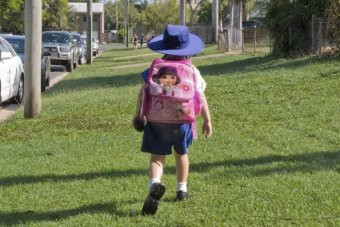
The Western Australian education system is failing to meet the needs of some highly disabled children because of inflexibility and a lack of expertise, according to an experienced educator.
Stephen Breen, the immediate past-president of the WA Primary Principals Association and a teacher and principal for 42 years, has been joined by disability advocates in criticism of the Education Department's inclusion practices.
However, the department's director general Sharyn O'Neill said more could always be done but the system was already set up with a high degree of flexibility to meet the specific needs of individual students.
Mr Breen agreed most children with developmental disability did very well in school, but said "we are failing some children and their families very badly".
He said that in particular, children who did not have the ability to be at school for a full day because of neurological and behavioural issues, were suffering.
"They really can't cope with being at school for those six hours, neurologically they're not able to do that," he said.
"That is a particular problem because what we have to do is basically restrain some of the children if they cannot do it."
Teachers were also at increased risk as a result.
He claimed teachers and education support workers had not been sufficiently trained to put in place inclusion policies and meet the individual needs of all children and families.
"A lot of parents want them in mainstream, the problem we've got is we probably don't have the expertise, and that's the issue," Mr Breen said.
 PHOTO: President of the WA Primary Principals' Association Stephen Breen. October 2013. (ABC News)
PHOTO: President of the WA Primary Principals' Association Stephen Breen. October 2013. (ABC News)
"We're talking about trainee teachers and we're talking about existing teachers.
"It's not about money, it's about a cultural change. You really do need to change management process, we need to upskill our teachers and our principals, we need to do it at the local school, we need to do it at training institutions."
Mr Breen said parents, teachers, child health experts and advocates should be brought together to determine what was best for each of these children, including the possibility of home schooling, with the department's support.
"Let's have an education assistant who can actually work in the school and at home. And if they go home, they go home and still do their school work," he said.
Education funding doesn't cover at home care
Ms O'Neill said that was not possible under the School Education Act which funded the department for education and care at school, not at home.
Exemptions were made mainly for severely ill children, who accessed distance education from home and took lessons over the internet.
She said if a student with a disability was not managing at school, the department had other highly specialised schools and programs that could be adjusted, in cooperation with the parents, to meet their needs.
"There are other ways that we can offer services. It's not just, do you fit in at school, are you having trouble at school, therefore you need to be in the home," she said.
Developmental Disability WA chief executive officer Taryn Harvey believed momentum towards inclusion in schools had stalled.
She said the education department needed to ensure parents had strong advocates to help meet their children's needs, and educators needed a greater capacity to respond to the diverse needs of children with disabilities and their families.
"If you've got families who have been traumatised by their experience at school, or have not had positive and constructive and strengthening relationships with their schools, they then take a lot of that anxiety and distress and frustration into the next round of negotiations that they have to have as they continue to support their kids across their life course," Ms Harvey said.
Ms O'Neill encouraged teachers to always listen to what parents told them about their children.
"We all want what's best for these kids, many of whom do it tough. And we're all on the same page," she said.
from http://www.abc.net.au/news/2017-02-17/w…;
Editorial: these children have to be somewhere during their day. Wherever they are, they can be learning and enjoying doing so. The claim in this story that "They really can't cope with being at school for those six hours, neurologically they're not able to do that" demonstrates how little expertise educators in Australia have.